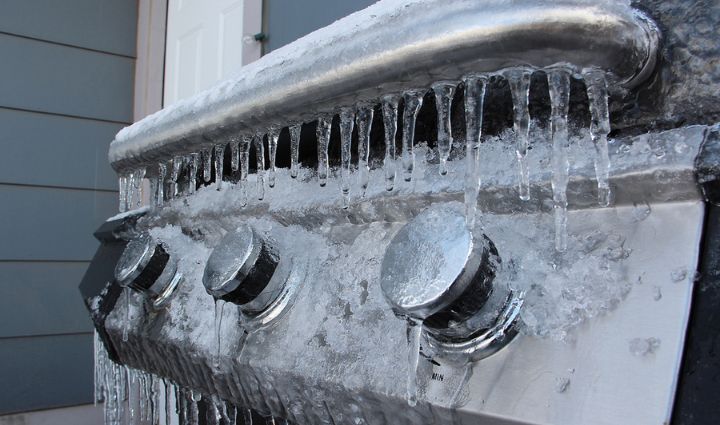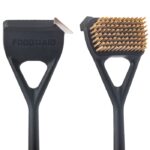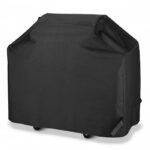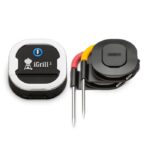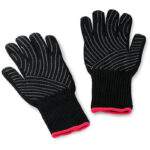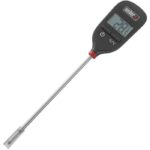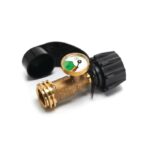Your teeth are chattering, your furnace is cranked up, and your warmest mittens are on standby—winter has arrived. If you live in a cold climate, you’re well-acquainted with the effects of the dipping mercury, but does cold weather affect a propane grill?
Whether you’re trying to decide whether to store your grill for the season or you’re ready to give winter grilling a try for the first time, you may be wondering if you can even use your propane or natural gas grill in cold weather. The short answer is yes, you can use a natural gas or propane grill in cold weather—but it’s not quite as simple as it is when the sun is high in the sky and you can wear shorts and sandals outdoors. Cold weather does affect propane and natural gas grills, and there are steps all grillers should take to keep their grills running smoothly all winter.
In this post, we’ll take a look at:
- How cold weather affects a propane grill
- How to make the best of cold weather grilling
- What to do if your propane grill isn’t working in cold weather
Let’s get cooking.
How Does Cold Weather Affect a Propane Grill?
Cold weather affects propane grills in a few different ways:
- Heating time: When it’s cold outside, your grill will take longer to heat up, and it will work harder to maintain the correct temperature.
- Fuel use: If your grill takes longer to heat and needs to work harder to maintain the right temperature, you’ll use more propane than you would in warmer temps.
- Cooking time: Your overall cooking time will be longer, once you factor in longer heating times and any temperature fluctuations caused by the cold.
- Propane depletion: The propane in your tank will shrink when temps are low. Unfortunately, once propane shrinks, there’s no going back—all you can do is refill or replace the tank.
- Ignition: Propane cannot ignite and vaporize at temperatures below -44 degrees fahrenheit (about -41 celsius), which means it will not turn into the gas needed to fuel your grill if temps drop below this level. Temperatures this low are almost certain to deter even the most avid griller, so chances are you won’t have to deal with frozen propane. However, even if it’s not quite -44, if your propane shrinks, pressure will drop and it may not be able to reach the burner, making it difficult or even impossible to light your grill.
Despite these setbacks, you can use a propane grill all winter (unless the temperature drops below -44, in which case why would you want to be outdoors grilling anyway?). You just have to make a few simple adjustments so you can use your propane grill in cold weather.
What About a Natural Gas Grill?
Though you don’t have to worry about propane shrinking, natural gas grills are subject to many of the same cold weather concerns as propane grills, including longer cooking times and difficulty reaching the right temperature. Make your cold weather natural gas grilling experience as soon as possible with our tips below.
How To Make The Best of Cold Weather Grilling
If you’re planning to use your propane grill in cold weather, follow these 10 tips:
- Give your grill a thorough cleaning, ideally before winter arrives. Cleaning your grill ensures that all the internal components are well-oiled and ready to grill all winter. If there are any clogs or blocks—even partial ones—your grill may be even more sensitive to temperature-related drops in fuel pressure, and you don’t want to have to worry about cleaning the burners when the mercury drops below 0. Learn how to clean a gas grill the right way.
- Keep extra propane on hand in case you end up running out of fuel halfway through cooking.
- Keep your grill and propane tank clear of snow and ice. Moisture can seep inside and freeze in the tank’s interior components, making it difficult to maintain pressure.
- Avoid grilling on windy days. The wind can make it even harder to maintain the right temperature, and you’ll need to use even more fuel to heat and maintain the right temperature.
- Leave the lid closed to retain heat. Avoid recipes that call for grilling with an open lid so you can keep as much heat as possible inside the grill.
- Choose quick-cooking recipes such as burgers. Recipes that cook quickly will require less propane—and less time spent outdoors in the cold while you cook.
- Replace stainless steel cooking grates with cast iron cooking grates. Cast iron grates are better able to retain heat than stainless steel.
- Get some heat-resistant gloves. They’ll keep your hands warm while you grill, but they’ll also resist any wayward flames that might ignite your usual wool or polyester gloves without compromising your dexterity.
- Invest in warming tools to keep your grill and propane tank from getting too cold. Grill jackets can help protect your grill from the cold temperatures, and a propane tank heater blanket can provide a uniform spread of heat that keeps the entire tank warm enough to prevent pressure loss or propane depletion.
- Consider a pellet grill, which relies on electricity for power rather than propane or charcoal. Electric grills make it easier to maintain the correct temperature and will use less fuel overall.
What To Do If Your Propane Grill Isn’t Working in Cold Weather
If your propane grill won’t work in cold weather, don’t panic. There are a few simple things you can try to get your grill fired up:
- Check the propane level. While a fuel gauge is the best way to check your propane tank in the summer, it may not work as effectively in the winter. Instead, try weighing your tank. A standard 20 pound tank will weigh between 37-38 pounds when full, while an empty tank will weigh closer to 18 pounds. You can also run warm water over the tank and run your hand along the side to check where it feels cool to the touch. The tank will be colder where there is propane inside.
- Check the burners. If your burners have frozen, they won’t ignite. To defrost them, remove them and take them indoors for a few hours, or use a blow dryer to unfreeze them.
- Check and/or replace the regulator. Your grill’s pressure regulator can break down over time, especially if water gets in the tank’s internal components and freezes. Regulators are easy to replace, but before you do, check that your grill hasn’t simply gone into bypass mode. Try resetting it first by shutting off the gas supply valve at the tank, disconnecting the regulator at the tank, waiting 30 seconds, then reconnecting the regulator.
- Check the igniter battery. Cold temperatures can suck the power out of batteries. If you have a battery-start grill, you may simply need to replace the igniter battery. Learn more about troubleshooting your gas grill igniter.
GRILL SPOT TIP: Some websites recommend bringing your propane tank indoors to warm up, but it is never safe to bring a propane tank indoors, even for a short time. Propane should always be stored outdoors, preferably in a dry, well-ventilated space out of direct sunlight.
Wrapping Up
While cold weather does affect propane grills in a number of ways, it’s still possible (and it’s usually pretty easy) to grill year-round—unless it’s -44 or below.
With a couple of simple adjustments, you can use your propane grill in cold weather. To make it even easier to grill in the cold, check out 12 of our best winter grilling tips and stock up on these essential winter grilling accessories.

